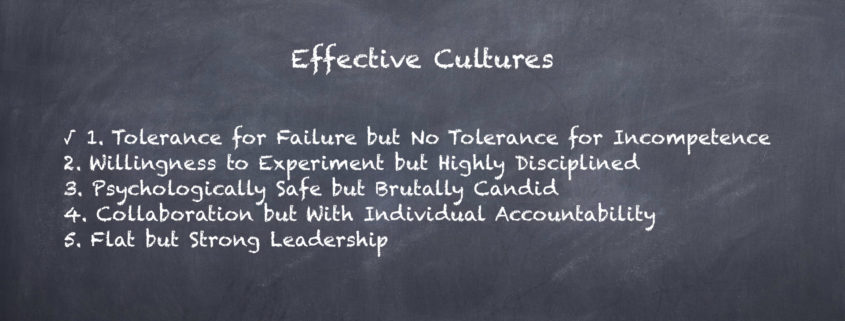A Word About Culture: Part One
A recent edition of Harvard Business Review carried an article entitled, “The Hard Truth About Innovative Cultures”. At first, we thought it was about Greek yogurt. Then we read it and learned it’s about the five characteristics of effective corporate cultures. Here they are:
- Tolerance for Failure but No Tolerance for Incompetence
- Willingness to Experiment but Highly Disciplined
- Psychologically Safe but Brutally Candid
- Collaboration but with Individual Accountability
- Flat but Strong Leadership.
This is the first in a series of five posts in which we will examine each of those characteristics from the perspective of our own organization.
Fine Lines
Any discussion about the relationship between failure and intolerance has to start with distinctions and balance. The article says this:
A tolerance for failure is an important characteristic of innovative cultures … And yet for all their focus on tolerance for failure, innovative organizations are intolerant of incompetence.
To strike the appropriate balance, we tend to distinguish mistakes from failure. We tolerate honest mistakes resulting from clear thought, sincere intents, and unforeseen eventualities. We don’t tolerate failures resulting from thoughtlessness, carelessness, or recklessness. And we take to heart a conversation we once heard over lunch at an industry conference:
Person 1: I heard one of your people made a huge mistake.
Person 2: Yep. It cost me $50,000.
Person 1: Did you get rid of the guy?
Person 2: Why would I do that? He didn’t piss off the client. And I just paid $50,000 for his education.
As far as we’re concerned, failing to try is a bigger indicator of incompetence than making an honest mistake in a sincere, well-thought-out effort. And lessons hard-learned are often the most effective.
A Calculated Gamble
There’s no such thing as perfection. We neither demand it nor expect it. But we do expect conscientiousness. We do expect honesty, integrity, and thoughtfulness. And we do expect people’s best efforts, even as we recognize anyone’s best efforts may fall short on occasion. It’s the gamble you take in business, in hiring, in being willing to trust and observe before you judge.
That approach has worked for us since 2001. And it’s kept our culture active, even though we’re not in the yogurt business.
Changing our approach now might be a mistake … or worse.





Leave a Reply
Want to join the discussion?Feel free to contribute!